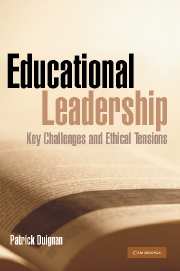Book contents
- Frontmatter
- Contents
- Acknowledgements
- Introduction and overview
- 1 Contemporary leaders and leadership under the spotlight
- 2 Key challenges for educational leaders
- 3 Leadership challenges as tensions
- 4 A framework for analysing tensions
- 5 Values and ethics in decision-making
- 6 A method for ethical decision-making
- 7 Shared and distributed leadership in schools
- 8 Why we need capable educational leaders
- 9 Why we need authentic educational leaders
- 10 Forming capable and authentic educational leaders
- References
- Index
9 - Why we need authentic educational leaders
Published online by Cambridge University Press: 05 June 2012
- Frontmatter
- Contents
- Acknowledgements
- Introduction and overview
- 1 Contemporary leaders and leadership under the spotlight
- 2 Key challenges for educational leaders
- 3 Leadership challenges as tensions
- 4 A framework for analysing tensions
- 5 Values and ethics in decision-making
- 6 A method for ethical decision-making
- 7 Shared and distributed leadership in schools
- 8 Why we need capable educational leaders
- 9 Why we need authentic educational leaders
- 10 Forming capable and authentic educational leaders
- References
- Index
Summary
Capable leaders are authentic leaders in terms of their values, intentions, practices and accomplishments. Authentic leaders engage in leadership actions and relationships that are ethical and moral (Terry, 1993). They are concerned with ethics and morality, especially as these relate to deciding what is significant, what is right and what is worthwhile (Duignan & Macpherson, 1992; Starratt, 1994; Sergiovanni, 1992). Such leadership elevates the actions of the leader above mere pragmatics or expediency (Hodgkinson, 1991); its focus is largely on ‘elevating leaders’ moral reasoning' (Terry, 1993, p. 46), which is central to Burns' (1978) seminal distinction between leadership that is transactional and that which is transformational. Transactional leaders are concerned with the everyday transactions that often consume a great deal of their time, but transforming leaders engage with others in ways that raise each other ‘to higher levels of motivation and morality’; they are moral because they help raise ‘the level of human conduct and ethical aspiration of both leader and led, and thus [they have] a transforming effect on both’ (Burns, 1978, p. 20). So, in this book, what I mean by ‘authentic leaders’ are those capable, relevant human beings who transform the lives of those they touch; in the case of authentic educational leaders, those they touch most of all are their teaching colleagues, students, parents and their local school communities.
Authentic educational leadership
Authentic educational leaders help infuse educational practice with a higher purpose and meaning (Duignan & Bhindi, 1997; Bhindi & Duignan, 1997).
- Type
- Chapter
- Information
- Educational LeadershipKey Challenges and Ethical Tensions, pp. 127 - 141Publisher: Cambridge University PressPrint publication year: 2007



